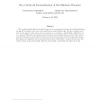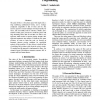140 search results - page 2 / 28 » A relation-algebraic approach to simple games |
ICALP
2009
Springer
14 years 5 months ago
2009
Springer
We consider graphical games in which edges are zero-sum games between the endpoints/players; the payoff of a player is the sum of the payoffs from each incident edge. We give a si...
CEC
2010
IEEE
13 years 6 months ago
2010
IEEE
In modern racing games programming non-player characters with believable and sophisticated behaviors is getting increasingly challenging. Recently, several works in the literature ...
DIGRA
2005
Springer
13 years 10 months ago
2005
Springer
With pervasive gaming, novel types of games have recently emerged. The idea is to apply pervasive computing technology - which embeds computers in real-world, everyday environment...
DIGRA
2005
Springer
13 years 10 months ago
2005
Springer
Videogames have been studied seriously only for a few years. So, we can wonder how we could use the recent academic works to approach new design methods. This article proposes a f...
AAAI
2000
13 years 6 months ago
2000
The game of Hex is a two-player game with simple rules, a deep underlying mathematical beauty, and a strategic complexity comparable to that of Chess and Go. The massive game-tree...


